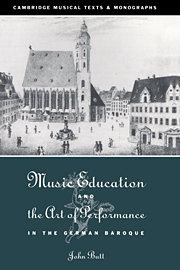Book contents
- Frontmatter
- Contents
- List of plates
- Preface
- Acknowledgements
- List of abbreviations
- 1 The establishment of Lutheran musical practice in the sixteenth century
- 2 The role of practical music in education c. 1600-1750
- 3 The contents, layout and style of instruction books
- 4 The development of performance practice and the tools of expression and interpretation in the German Baroque
- 5 Ornamentation and the relation between performer and composer
- 6 The decline of the Lutheran cantorates during the eighteenth century
- Notes
- Bibliography
- Index
4 - The development of performance practice and the tools of expression and interpretation in the German Baroque
Published online by Cambridge University Press: 03 December 2009
- Frontmatter
- Contents
- List of plates
- Preface
- Acknowledgements
- List of abbreviations
- 1 The establishment of Lutheran musical practice in the sixteenth century
- 2 The role of practical music in education c. 1600-1750
- 3 The contents, layout and style of instruction books
- 4 The development of performance practice and the tools of expression and interpretation in the German Baroque
- 5 Ornamentation and the relation between performer and composer
- 6 The decline of the Lutheran cantorates during the eighteenth century
- Notes
- Bibliography
- Index
Summary
While issues of performance technique, style and expression undoubtedly come to the fore in texts from the late sixteenth century onwards, earlier musicians cannot have been entirely unconcerned with interpretation, and the lack of written documentation does not necessarily mean that it was never discussed. Nevertheless, there is obviously a striking contrast between earlier treatises dealing with the rudiments required for performance and those later ones that are equally elementary but add recommendations on technique and style. Significantly, many of the vocal rules of the early seventeenth century are drawn directly from those few sixteenth-century writings which mention vocal technique. This could point either towards a codification of an existing practice or to a desire to justify rules for the present by earlier prescriptions. In any case, the noticeable expansion of treatises concerned with the actual practice of performance doubtless reflects the development of musica practica in Germany as the science of performance, something with its own rules and defining characteristics. Praetorius makes this explicit in his dedicatory foreword to Syntagma musicum, part 3, of 1619:
So I have now in this third, and in the following fourth, volume compiled and written the most important things that a Kapellmeister who is a singing-master and musicus practicus will need to know, particularly in the present time when music has risen so high that one can hardly believe that it can come any higher.
- Type
- Chapter
- Information
- Publisher: Cambridge University PressPrint publication year: 1994



